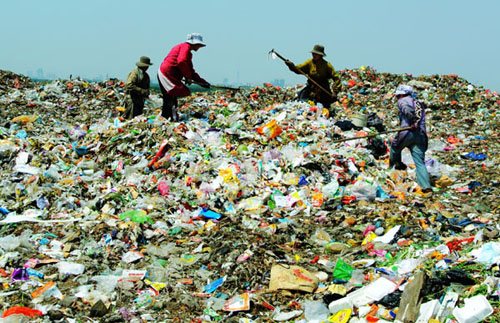
Farmers search for plastic bottles and other recyclable items this month on a 28-meter-high hill of garbage in Yuanfuzhuang, in Central China's Henan Province. Villagers earn about 1,500 yuan ($240) a month selling the reclaimed materials, which is their only source of income. There is little farmland to support families because the local government claimed much of it to enlarge the landfill. Photos by Xiang Mingchao / China Daily
For almost 10 years, Du Na has watched as a mountain of garbage piled up next door to her home.
"Ever since I moved here after getting married, it's just gotten higher and higher," she said, looking at the landfill, which now covers more than 6 hectares and stands up to 28 meters tall.
The trash titan is about 50 meters from Du's house in Yuanfuzhuang village, a suburb of Kaifeng, Henan Province.
"During the morning and evening rush hours, a truckful of waste is dumped here every five to 10 minutes," said the 35-year-old mother of two.
Figures from the provincial environmental protection department show that more than 4 million tons of trash have been dumped on the site since it opened 18 years ago, with another 700 to 800 tons arriving from downtown Kaifeng daily.
Moreover, the sprawling mountain of garbage has steadily grown to claim more than 70 percent of the town's farmland.
"When I moved here in 2003, each villager had about 3 mu (0.2 hectares) of land. Now they have less than 0.7 mu," Du said.
To enlarge the area of the landfill, the local government bought the rights to the farmland from villagers in 2005 for 20,000 yuan ($3,170) per mu.
"We lost our farmland, yet the compensation was enough to cover the cost of living for only two or three years," Du said. "What can we live on after using up the money?"
Wang Zhengya, deputy director of the provincial environmental protection department, said the landfill is the only one in the province's 18 cities that does not have any waste-processing equipment. He blames the situation on "historical reasons," such as funding shortages.
The unprocessed waste has threatened drinking water as well as the air, which are problems that must be tackled as soon as possible, he said.
According to Ministry of Environmental Protection data, there were 935 landfills nationwide in 2008, with a combined capacity of 2.34 billion cubic meters. And 34 percent of these sites do not have any measures to prevent the pollution of the soil and groundwater, according to the ministry.

Copyright ©1999-2011 Chinanews.com. All rights reserved.
Reproduction in whole or in part without permission is prohibited.